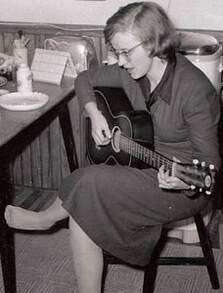
In 1961, discouraged and depressed, she moved to Ann Arbor, where her younger brother Philip Converse was a prominent political scientist at the Institute for Social Research, and ended up with a job writing and editing for the Journal of Conflict Resolution. Then, in 1972, the journal was auctioned off to Yale without her knowledge, and at around the same time she was informed that she needed major surgery.
Finally, in 1974, after writing letters to her relatives stating her intentions to try and make a new life for herself somewhere else and asking them not to look for her, she drove off in her little Volkswagen--and was never seen or heard from again.
Her work briefly came to public attention in 2004, when the graphic artist Gene Deitch, a longtime supporter of her work, played some of it on the radio; this led to a search for more of her music, which turned up in a filing cabinet in Ann Arbor, followed by the release of a 17-song album in 2009. But except for this little flurry of activity, she and her work have otherwise remained largely unknown.
That is about to change. The 100th anniversary of her birth and the 50th anniversary of her disappearance are coming up in 2024 and are already being marked by some long-overdue recognition for her work:
- A beautiful, sensitive piece entitled "The Art of Disappearance," by Hanif Abdurraqib, including a strikingly evocative illustration, was published in the New York Times Magazine on August 11 (updated August 17), 2022.
- The opera singer Julia Bullock delivered a stunning performance of a Converse song, One by One, accompanied by her husband Christian Reif on piano, in her debut solo album released in late 2022.
- In Catherine Lacey’s new novel Biography of X, published on March 21, Connie Converse is portrayed as having been X’s lesbian lover and music partner. Lacey resolves the unanswered question of Connie's fate by writing a fictional ending for her.
- A major biography by Howard Fishman, To Anyone Who Ever Asks, was published on May 2.
- The Connie Converse story (though unnecessarily evasive about what little is known about her disappearance) made the front page of the New York Times on May 8.
- An article by Eve Silberman is featured in the May edition of the Ann Arbor Observer (a reminder that the Connie Converse story is in part an Ann Arbor story).
- Ronnie Kuller, a Chicago-based composer and arranger, is collaborating with the singer Emmy Bean on an ambitious orchestral arrangement and vocal performance called Her Only Light, devoted entirely to Connie Converse and her songs, to be presented next fall at the Steppenwolf Theater. After that, they are planning to take the show on tour, including fulfillment of their dream of bringing Connie Converse back to Ann Arbor, the town that at first provided her with solace and refuge when she so badly needed them but ultimately led to disillusionment and despair.
My daughter Julie is assisting Kuller and Bean with their project and helping them spread the word. She is the one who introduced me to Connie Converse. A sampler of their program will be premiered on May 19, both live in Chicago and online. (To purchase tickets click here.)
[originally published April 30, 2023; updated periodically as the Connie Converse story continues to unfold]
 RSS Feed
RSS Feed